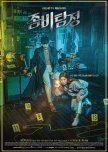This review may contain spoilers
Surprisingly Wholesome
This is the first review I've done, but I felt compelled because of how much I loved and adored this show.
First off, this show is equally a comedy and a drama. There are puns, script-sequences (and dreams), and slapstick humor. But there's also murders, mysteries, and emotional angst. Additionally, there are hints at romance and feelings of that nature between the two leads, whose developing bond/trust carries the show in the latter half, but it is not acknowledged between the two or explored. And understandably so. I mean, he is a zombie. However, it does result in an open ending that's actually nice and hopeful. So if you're looking for romance, you may be satisfied enough; if you're not, there's nothing explicit to repel you.
On to the details. I went into this drama with low and uncertain expectations, and from episode 3 (3/12, or 5&6/24) onward it consistently surprised me. For the most part, the plot was unpredictable. If you watch a lot of shows in general then you can guess the parameters of what will or won't happen, but the situations the characters got in, the cases pursued, and the plot twists - especially those of the Santa Killer and the main zombie origins storylines - were well-paced and subtly foreshadowed. Few things happened completely out of the blue but few things were ridiculously obvious either. The limit of 12 hours for run-time helped keep the story concise and humming along.
The only times it dragged were episodes 1-2 and later 9-10. 1-2 were slow because they were used for set-up. However, the time spent establishing the many characters and more importantly how the zombie science/logic works built the foundation for the rest of the show. The audience isn't dropped in as much as some other shows and I actually appreciated that. I also can't recall any plots, arcs, or character quirks that suddenly disappeared by the finale or were left hanging unaddressed. There was even a call-back to Seon Ji's former PD in episode 11, which was nice. For episodes 9-10, which were heavier on the gimmicks than any of the others, the divergence to the brother-in-law's scripts was used as a comedy reprieve. I usually hate comedy in this slapstick style but I actually enjoyed these scenes! I don't know, they just worked! The show made fun of itself in these moments and you can tell the cast had a lot of fun on set.
All the characters had their own charm, too. There were the bumbling neighboring detectives that like someone said look like they've come out of the '80s, the female lead's quirky family, the small-town style and good-natured police station, and the leads themselves. The male lead starts out as a shell of a person motivated to return to being human, find himself, and fill in his memories. The answers he finds genuinely made me cry. But it's the journey with Seon Ji at his side and everyone else comprising this found-family trope that really helps him find peace with himself, zombie and/or human. Also, some comments disparaged the female lead for her reckless behavior. This proved to be very much part of her character arc and the actress did a great job with that, I think. Seon Ji could actually be quite clever. She was just most motivated by her passion for justice, and that's not bad, because she did get better at pausing to think and she did learn how to channel it better by the end.
In the finale, the male lead thinks about the humans and zombies he's seen and uses the word 'humane', and I think that's what the heart of this story came down to. The question posed from the very beginning was: what's the difference between a zombie and a human? A question with an obvious answer, right? But the male lead hates himself and is constantly fighting to repress his hunger for humans. His hesitancy to kill, even for the safety of others, is actually a detriment several times. He starts off actually scared of humans, then learns it's more nuanced than that. There's many good - and many evil. It's all about how humane a person is - who a person is, not what - that matters. Maybe I'm thinking too deeply about this silly show, but it's because of this and the consistent use of the found-family trope that I called this show surprisingly wholesome. It's a zombie show, but it's not just a zombie show.
As said, the ending offers hope and wraps up almost all the threads nicely. Some are left open intentionally I think for a second season, judging by the post-credits scene, while others were left open only because they weren't explicitly spelled out, though the future for the characters was obvious. I usually have a complaint here or there by the end but honestly I can't think of anything. I enjoyed the whole ride.
First off, this show is equally a comedy and a drama. There are puns, script-sequences (and dreams), and slapstick humor. But there's also murders, mysteries, and emotional angst. Additionally, there are hints at romance and feelings of that nature between the two leads, whose developing bond/trust carries the show in the latter half, but it is not acknowledged between the two or explored. And understandably so. I mean, he is a zombie. However, it does result in an open ending that's actually nice and hopeful. So if you're looking for romance, you may be satisfied enough; if you're not, there's nothing explicit to repel you.
On to the details. I went into this drama with low and uncertain expectations, and from episode 3 (3/12, or 5&6/24) onward it consistently surprised me. For the most part, the plot was unpredictable. If you watch a lot of shows in general then you can guess the parameters of what will or won't happen, but the situations the characters got in, the cases pursued, and the plot twists - especially those of the Santa Killer and the main zombie origins storylines - were well-paced and subtly foreshadowed. Few things happened completely out of the blue but few things were ridiculously obvious either. The limit of 12 hours for run-time helped keep the story concise and humming along.
The only times it dragged were episodes 1-2 and later 9-10. 1-2 were slow because they were used for set-up. However, the time spent establishing the many characters and more importantly how the zombie science/logic works built the foundation for the rest of the show. The audience isn't dropped in as much as some other shows and I actually appreciated that. I also can't recall any plots, arcs, or character quirks that suddenly disappeared by the finale or were left hanging unaddressed. There was even a call-back to Seon Ji's former PD in episode 11, which was nice. For episodes 9-10, which were heavier on the gimmicks than any of the others, the divergence to the brother-in-law's scripts was used as a comedy reprieve. I usually hate comedy in this slapstick style but I actually enjoyed these scenes! I don't know, they just worked! The show made fun of itself in these moments and you can tell the cast had a lot of fun on set.
All the characters had their own charm, too. There were the bumbling neighboring detectives that like someone said look like they've come out of the '80s, the female lead's quirky family, the small-town style and good-natured police station, and the leads themselves. The male lead starts out as a shell of a person motivated to return to being human, find himself, and fill in his memories. The answers he finds genuinely made me cry. But it's the journey with Seon Ji at his side and everyone else comprising this found-family trope that really helps him find peace with himself, zombie and/or human. Also, some comments disparaged the female lead for her reckless behavior. This proved to be very much part of her character arc and the actress did a great job with that, I think. Seon Ji could actually be quite clever. She was just most motivated by her passion for justice, and that's not bad, because she did get better at pausing to think and she did learn how to channel it better by the end.
In the finale, the male lead thinks about the humans and zombies he's seen and uses the word 'humane', and I think that's what the heart of this story came down to. The question posed from the very beginning was: what's the difference between a zombie and a human? A question with an obvious answer, right? But the male lead hates himself and is constantly fighting to repress his hunger for humans. His hesitancy to kill, even for the safety of others, is actually a detriment several times. He starts off actually scared of humans, then learns it's more nuanced than that. There's many good - and many evil. It's all about how humane a person is - who a person is, not what - that matters. Maybe I'm thinking too deeply about this silly show, but it's because of this and the consistent use of the found-family trope that I called this show surprisingly wholesome. It's a zombie show, but it's not just a zombie show.
As said, the ending offers hope and wraps up almost all the threads nicely. Some are left open intentionally I think for a second season, judging by the post-credits scene, while others were left open only because they weren't explicitly spelled out, though the future for the characters was obvious. I usually have a complaint here or there by the end but honestly I can't think of anything. I enjoyed the whole ride.
Was this review helpful to you?







